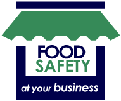HACCP Audits
HACCP stands for Hazard Analysis Critical Control Points, and is an internationally recognized system used to enhance food safety throughout the food chain. It is based on science, rather than simply experience or subjective judgment. Focus is on preventing problems before they occur. This approach yields far better results than trying to detect failures through product testing. Most food producing companies around the world are using HACCP to prevent, reduce and eliminate potential food safety hazards, including those caused by cross-contamination. HACCP identifies physical, allergenic, chemical, and biological hazards in production processes that can cause the finished product to be unsafe and designs measures to reduce these risks to a safe level.
Benefits :• It provides a systematic approach and control measures to cover all aspects of food safety.
• Increase awareness among employees about hygiene.
• Gives competitive advantage to businesses.
• Defines clear roles and responsibilities for everyone involved in the food production process.
• Increase consumer confidence in the safety of the food product.
• Long-term cost saving by reducing losses due to processing or rejection of products.
• A preventative system that enhances traditional quality control.
• Increase the effectiveness of quality control systems by focusing on critical stages of process.
• Help improve the employee productivity through continuous training and learning.
• Assign greater responsibility to employees about the safety of food.
• It is recognized at international level as the most efficient system for managing risks.
• HACCP system is an integral part of ISO 22000:2005
• Demonstrate leadership commitment to quality and safety.
• Verification of good business and hygiene practices.
• Helps setup the process in product traceability.
• Ensure continuous improvement.
• Helps comply with legal and market requirements.
Role of 3rd Party Audits in HACCP:
3rd Party auditors must have sufficient knowledge, skills and experience in order to develop, implement and validate/verify supplier-auditing programs. Their services include Supplier Auditing Optimization, development and assistance with implementation of new programs (including providing guidelines for selecting Third Party Auditors, the role of consumer complaint monitoring and cost implications to you and your suppliers).Common principles 3rd Party Auditors should follow during HACCP Audits :
> Hazard Analysis> Determining Critical Control Points
> Establishing Critical Limits
> Monitoring Procedures
> Corrective Actions
> Re-evaluation & Documentation
James Shepherd from Food Safety Systems is registered as a regulatory 3rd party auditor for the NSW Food Authority (verification no. 24733). He also holds the National Food Safety Auditor (level 4) from RABQSA (no. 111946). With 25 years' experience in the food industry, extensive knowledge and practical experience in aged care (including aged care management and head chef experience), Food Safety Systems are able to ensure a consistent approach when auditing aged care facilities. Please visit http://www.foodsafetysystems.net.au/ for more info.
function checkWholeForm(theForm) { var why = ""; if (theForm.EmailAddress) if (theForm.EmailAddress.value.length > 0) why += checkEmail(theForm.EmailAddress.value); if (theForm.CaptchaV2) why += isEmpty(theForm.CaptchaV2.value, "Enter Word Verification in box below"); if (why != "") { alert(why); return false; } return true; } //


